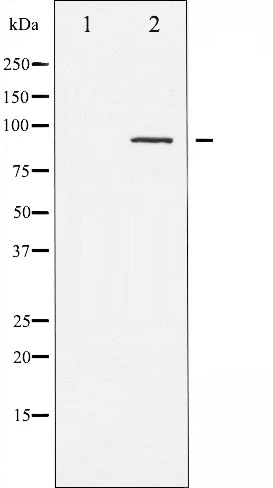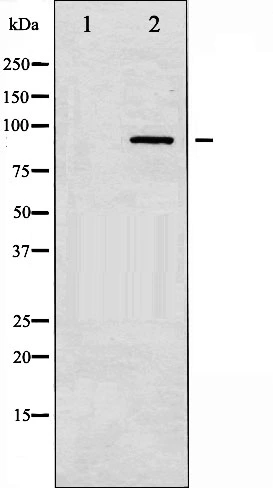
Western blot analysis of PKC alpha phosphorylation expression in NIH-3T3 whole cell lysates,The lane on the left is treated with the antigen-specific peptide.
PKC alpha (phospho Thr497) antibody
GTX52316
ApplicationsImmunoFluorescence, Western Blot, ImmunoCytoChemistry, ImmunoHistoChemistry
Product group Antibodies
ReactivityHuman, Mouse, Rat
TargetPRKCA
Overview
- SupplierGeneTex
- Product NamePKC alpha (phospho Thr497) antibody
- Delivery Days Customer9
- Application Supplier NoteWB 1:500-1:2000, IHC 1:50-1:200, IF/ICC 1:100-1:500
- ApplicationsImmunoFluorescence, Western Blot, ImmunoCytoChemistry, ImmunoHistoChemistry
- CertificationResearch Use Only
- ClonalityPolyclonal
- Concentration1 mg/ml
- ConjugateUnconjugated
- Gene ID5578
- Target namePRKCA
- Target descriptionprotein kinase C alpha
- Target synonymsAAG6, PKC-alpha, PKCA, PKCI+/-, PKCalpha, PRKACA, protein kinase C alpha type, PKC-A, aging-associated gene 6
- HostRabbit
- IsotypeIgG
- Scientific DescriptionProtein kinase C (PKC) is a family of serine- and threonine-specific protein kinases that can be activated by calcium and the second messenger diacylglycerol. PKC family members phosphorylate a wide variety of protein targets and are known to be involved in diverse cellular signaling pathways. PKC family members also serve as major receptors for phorbol esters, a class of tumor promoters. Each member of the PKC family has a specific expression profile and is believed to play a distinct role in cells. The protein encoded by this gene is one of the PKC family members. This kinase has been reported to play roles in many different cellular processes, such as cell adhesion, cell transformation, cell cycle checkpoint, and cell volume control. Knockout studies in mice suggest that this kinase may be a fundamental regulator of cardiac contractility and Ca(2+) handling in myocytes. [provided by RefSeq, Jul 2008]
- ReactivityHuman, Mouse, Rat
- Storage Instruction-20°C or -80°C,2°C to 8°C
- UNSPSC12352203
References
- Iannotti FA, Pagano E, Guardiola O, et al. Genetic and pharmacological regulation of the endocannabinoid CB1 receptor in Duchenne muscular dystrophy. Nat Commun. 2018,9(1):3950. doi: 10.1038/s41467-018-06267-1Read this paper



